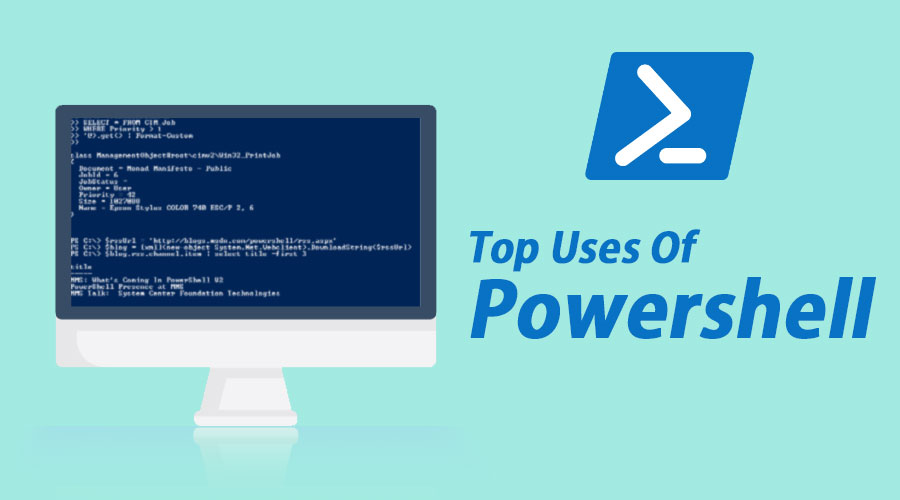Without a doubt, Microsoft PowerShell is a powerful application. Microsoft created this task-based command-line shell and scripting language to make managing Windows apps and operating systems easier. It accomplishes this by assisting you with data management, system configuration, and process automation.
Since its release, its wide range of features has helped to make it popular among businesses. It is a versatile, cross-platform scripting language that works with Windows, MacOS, and even Linux.
In case you need more convincing, here are the top 12 benefits of using PowerShell, as listed by a leading small business IT support company:
Easy to use and understand
Because PowerShell’s syntax is built on well-known verbs and nouns, it is straightforward and consistent, making it ideal for beginners. There are simple command sequences like “Get-Process” and “Stop-Service” that you can utilise to accomplish ordinary operations. There is also the “Get-Help” command which gives you access to a multitude of topics and examples.
Adaptable and expressive
PowerShell is regarded as expressive and adaptable because it enables you to create scripts, functions, classes, and modules that may capture intricate functionality and logic. Moreover, PowerShell can generate reusable and dynamic code by utilising loops, conditionals, variables, operators, and other standard programming structures.
Pipeline-based and object-oriented
PowerShell works with objects rather than text, allowing you to access the properties and techniques of the objects you work with. After that, you may be sent to other commands via a pipeline. Because of this, PowerShell can be used to easily develop complex scripts and automate difficult processes.
Used in conjunction with Windows and other platforms
The additional benefit of PowerShell, like other Microsoft services and products, is that it can take advantage of Windows and even other operating systems’ features and capabilities. Managing files, the registry, services, processes, event logs, certificates, users, groups, devices, printers, network settings, and much more is made simple for users by PowerShell.
This indicates that PowerShell may communicate with other useful programs and technologies, such as Active Directory, Microsoft Office, Azure, SQL Server, Exchange, SharePoint, and others. You can learn more about these other programs through Babble, an IT support London company.
Extensive and customisable
The modular design of PowerShell, which enables you to add and remove new commands and features by simply importing modules, is something that many users find useful. It is simple to develop and distribute modules with others.
With PowerShell’s flexible formatting mechanism, you may additionally regulate how commands’ output is presented.
Accepts standard data formats
For users who need to work with data in other forms – such as CSV, JSON, XML, HTML, and more – built-in support is available. There are simple commands like “Import-Csv”, “ConvertTo-Json”, “Select-Xml” and “Invoke-RestMethod” where you can read and write data from files or online services.
The extra advantage of this is that you may alter any data using PowerShell by applying filters, sorting, grouping, aggregation, and other operations.
Makes remote management possible
PowerShell Remoting is a feature that enables you to launch scripts or commands on one or more distant machines. Commands like “Invoke-Command” or “Enter-PSSession” are used to run code on distant computers and devices. Persistent sessions that can be utilised repeatedly across several tasks may also be created and imported using the “New-PSSession” or “Import-PSSession” commands.
Allows for parallel processing
One beneficial feature of PowerShell is Workflow, which enables you to conduct complicated or time-consuming operations in parallel on several computers or devices. The Workflow keyword makes it simple for you to create workflow scripts that manage checkpoints, pause, resume, and restart. There are other keywords that make it simple to execute instructions or even whole code blocks simultaneously.
Facilitates testing and debugging
You may use the PowerShell Script Analyzer feature to evaluate your scripts for compatibility problems, possible mistakes, and best practices. Additionally, you may establish breakpoints, walk through code, examine variables, and evaluate expressions in your scripts or functions with the help of a tool called PowerShell Debugger.
Promotes cross-platform growth
One of the most common reasons to adopt PowerShell is its support for cross-platform development on Linux, MacOS, and Windows platforms. This implies that you won’t need to make many modifications to utilise the same code and procedures on various operating systems. Variables to identify the platform the script is operating on are also available.
Promotes compliance and security
PowerShell Execution Policy is a feature that allows you to manage the way scripts are executed on your computers. You may easily configure the execution policy for your system, user, or session by using commands like “Set-ExecutionPolicy” or “Get-ExecutionPolicy”. Moreover, you may audit and keep an eye on PowerShell’s activity on your system thanks to a feature called PowerShell Logging.
Promotes community and teamwork
One of the main benefits of adopting PowerShell is its vibrant user and developer community, which is constantly exchanging code, expertise, and information. You may search and install community-shared modules, scripts, and resources through the PowerShell Gallery. There are also numerous online platforms (e.g. forums, Stack Overflow, Reddit, etc.) where you can ask questions about PowerShell and receive swift responses and comments.
Conclusion
PowerShell is a versatile and effective work of technology used to effectively manage several system administration tasks. Among the many reasons to use it are its numerous features and benefits that distinguish it from other solutions, as well as the fact that it is easy to understand and use. If you are still debating whether or not to adopt PowerShell into your business, you can consult Babble – a trustworthy IT company – to help you through Microsoft 365 consultants.
